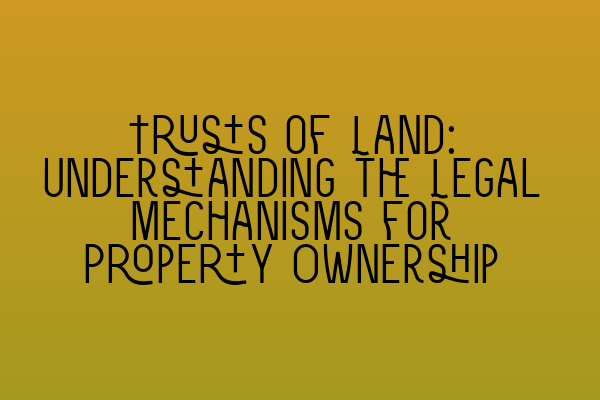Trusts of Land: Understanding the Legal Mechanisms for Property Ownership
Welcome to another informative blog post from SQE Property Law & Land Law. Today, we will be delving into the intricate world of trusts of land and helping you gain a better understanding of the legal mechanisms involved in property ownership. Whether you are a solicitor, law student, or simply an individual looking to expand your knowledge, we’ve got you covered.
But before we dive into the specifics, let’s briefly explain what a trust of land is. In simple terms, it refers to a legal arrangement where one person, known as the trustee, holds the legal title to a property and is responsible for managing it for the benefit of another person or persons, known as the beneficiaries. Trusts of land come in various forms and can play a significant role in property transactions, estate planning, and family arrangements.
Now, let’s explore the different types of trusts of land and the legal mechanisms associated with each.
1. Bare Trusts:
A bare trust, also known as a simple trust, is the most basic form of trust. In this type of trust, the legal title of the property is held by the trustee, while the beneficiary has the absolute right to both the property and its income. Bare trusts are often used for holding assets for minors or giving gifts to family members.
2. Fixed Trusts:
Fixed trusts, as the name suggests, provide beneficiaries with a fixed interest in the property. The beneficiaries are entitled to a predetermined share of the property’s income or proceeds upon sale. This type of trust is commonly used in family arrangements or for tax planning purposes.
3. Discretionary Trusts:
Unlike fixed trusts, discretionary trusts provide the trustees with the power to distribute the property’s income and capital among a group of beneficiaries as they see fit. The trustees have discretionary powers and can consider individual circumstances when making decisions. This type of trust offers flexibility and can be useful for asset protection and minimizing inheritance tax.
4. Resulting Trusts:
Resulting trusts arise in situations where the legal owner of the property holds it on trust for someone else. This can happen, for example, when two or more individuals contribute to the purchase of a property, but the legal title is solely in the name of one person. In such cases, a resulting trust may be implied to ensure fairness and reflect the true intentions of the parties involved.
5. Constructive Trusts:
Constructive trusts are a remedy used by the courts to correct situations where the legal owner of the property holds it unconscionably or unjustly. It is commonly applied in cases such as fraud, breach of fiduciary duty, or where there is an informal agreement to hold the property on trust. Constructive trusts aim to prevent unjust enrichment and maintain fairness.
Understanding the legal mechanisms involved in trusts of land is crucial for property owners, prospective buyers, and legal professionals. Properly establishing and managing a trust can have significant implications on taxation, inheritance, and property rights. Therefore, it is important to seek expert advice to ensure compliance with the law and protect your interests.
At SQE Property Law & Land Law, we have a team of experienced solicitors who are well-versed in trust law and property matters. Whether you need assistance in setting up a trust, clarifying your rights as a beneficiary, or resolving a dispute, we are here to help. Contact our knowledgeable team to discuss your specific needs and find the best legal solutions for your situation.
In conclusion, trusts of land are a complex yet essential aspect of property ownership. Whether you are dealing with a bare trust, fixed trust, discretionary trust, resulting trust, or constructive trust, understanding the legal mechanisms involved is key to protecting your interests and ensuring a smooth transaction or arrangement. Seek expert advice, stay informed, and ensure compliance with the law to maximize the benefits of trusts of land.
For more insightful articles on various legal topics, check out our related articles:
– Understanding Contractual Capacity: Rights and Limitations
– Interactive SQE Mock Tests for Contract Law: Test Your Knowledge
– Join Our SQE Contract Law Webinars: Expert Insights and Guidance
– Contract Law Reforms: An Analysis of Recent Changes
– Parties in a Contract: Rights and Responsibilities
Stay tuned for more in-depth articles and legal insights from SQE Property Law & Land Law.
